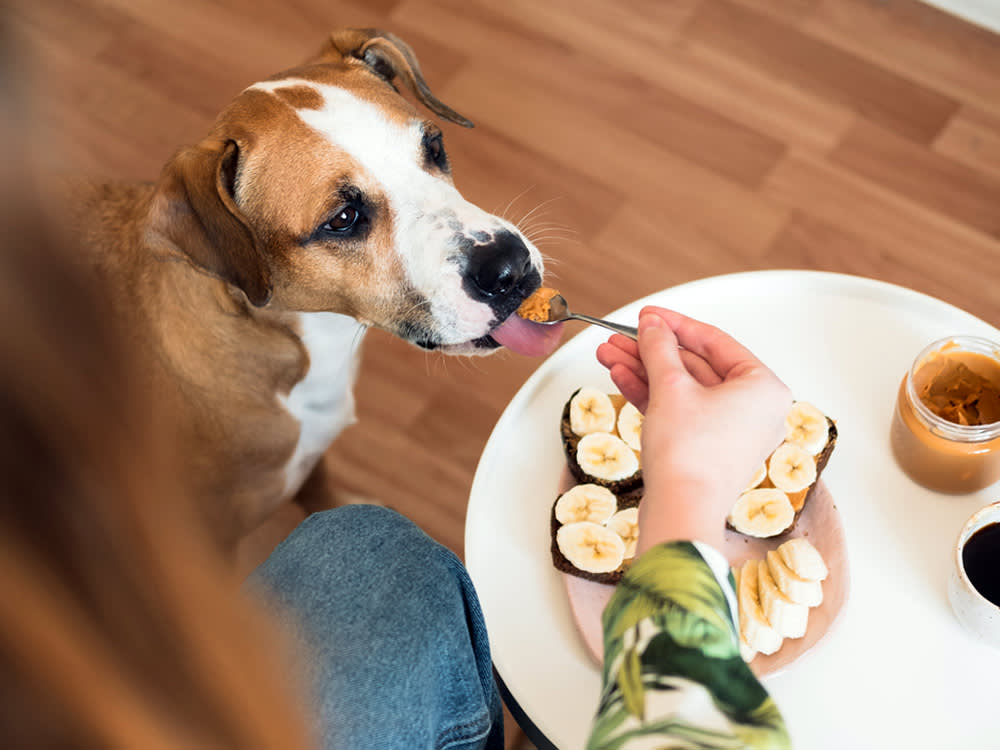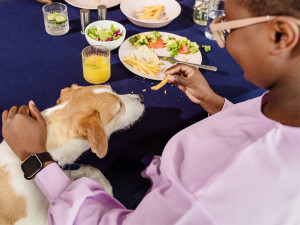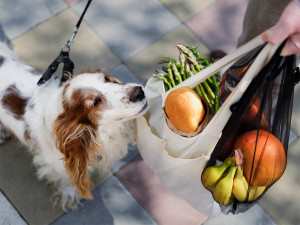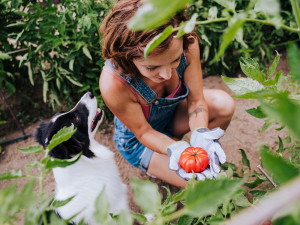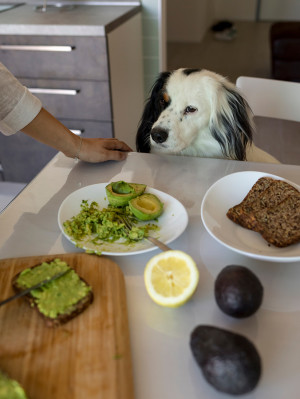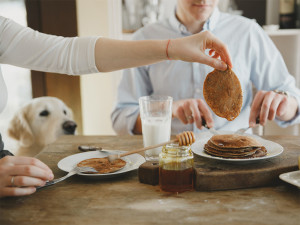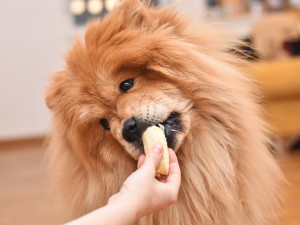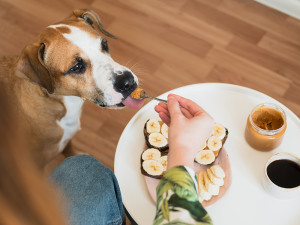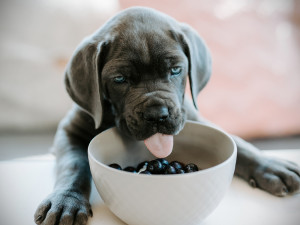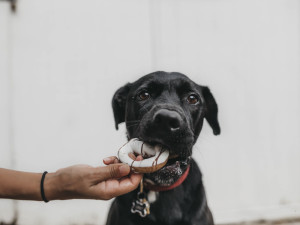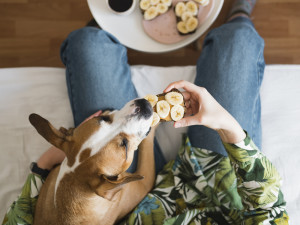Can Dogs Eat Peanuts?
Peanuts are a great occasional protein-packed snack, but pay attention to this guidance.
Peanuts, earth nuts, goobers; whatever you call them, they are everywhere and can be a delicious part of a healthy diet for people. And that may have you wondering if your dog can eat peanuts, too. The good news is that peanuts are a healthy and non-toxic treat for dogs.
So, whether you like your goobers boiled, ground into peanut butter, or roasted, you can most likely share a little bit with your pup. There are some important points to keep in mind when it comes to sharing peanuts with your dog, so be sure to read the details to learn more before you do.
Nutrition facts about peanuts for dogs
Peanuts are the fruit of the Arachis hypogaea plant. And while they are neither peas nor nuts, technically, they are more like peas in that they are characterized as legumes and members of the Fabaceae family. Legumes, like peanuts, have many health benefits. They provide important nutrients, including protein, fats, fiber, vitamins, and minerals. Additionally, they also have potent antioxidants that play a role in protecting cells from oxidative damage, especially when peanuts are eaten with the skin, and even more so if they are boiled.
Are peanuts good for dogs?
Peanuts can be a healthy snack for dogs, due to their many nutritional benefits. If you are thinking of sharing small amounts of peanuts with your pup, here are some of the benefits they can provide.
How much do you spend on your pet per year?
High protein: Protein is a critical nutrient for dogs. It provides amino acids, which are the building blocks for new proteins, enzymes, and some hormones that are necessary for normal life functions. Protein also acts as a source of energy. Since dogs require a consistent amount of protein in their diets, commercial dog foods must provide a minimum amount of protein to meet these needs. Any additional snacks or treats that provide protein are an added bonus.
High fat: Peanuts are high in monounsaturated fats. Fats are a great source of energy for dogs. Not all dogs tolerate high fat foods well, however, including dogs with a history of pancreatitis or dogs who are overweight. Consult your vet before sharing peanuts if your dog has any of these conditions.
Fiber: Fiber is technically a carbohydrate that is not completely broken down during digestion. It can add bulk to the stool, preventing constipation and leading to feelings of fullness without adding calories. Some fiber also provides important nutrients to the good bacteria of the microbiome.
Vitamins and minerals: Peanuts contain many valuable vitamins and minerals including B vitamins, phosphorus and magnesium, too.
Can dogs eat all parts of the peanut?
Dogs should not eat whole peanuts in the shell. The shell is made up of a very fibrous hull that is not digestible. Eating peanut shells will cause digestive upset, including nausea, vomiting, gas, and/or diarrhea. In severe cases, large amounts of peanut shells can also cause an obstruction. If they get stuck within the intestines and cannot pass, this is a medical emergency and requires emergency surgery to relieve the blockage.
Are peanuts completely safe for dogs?
Plain peanuts are quite safe for dogs, as long as you take a few precautions when feeding them. Here are some important points to consider:
Other ingredients: Many varieties of peanuts are prepared with extra ingredients to enhance the flavor. Be sure to check the ingredients on any peanuts you plan to share with your pup. Avoid peanuts that have added salt, spices, sugar and other ingredients that may be toxic or unhealthy for dogs. Stick with plain peanuts instead.
Choking hazards: Peanuts are firm and round and could be a choking hazard, especially for small and toy-breed dogs. It would be best to crush them into smaller pieces instead of offering a whole peanut in these cases. Also, never offer the peanut shell to dogs as this can be a choking hazard as well as a risk for digestive upset and intestinal blockages.
High in fat: While high-fat foods can be a great source of energy for active dogs, it is also important to keep in mind that this adds lots of calories, too. If you have a dog who is not very active, or already overweight, you’ll want to avoid high-fat snacks and treats. The same goes for dogs with certain health conditions, like pancreatitis, who need to avoid high-fat snacks altogether.
Aflatoxin: This is a very rare phenomenon, but certain foods like peanuts and corn have been known to be contaminated with a fungus called aspergillus, which makes a toxin called aflatoxin. This can be nearly undetectable as it does not result in visible mold on the food. If dogs consume contaminated food, they can develop liver failure. While you cannot completely avoid the risk, be sure to only share foods with your pup that are fresh, properly stored, and are not expired.
The bottom line: Can dogs eat human food?
There are many delicious foods you can share with your pup that are not only tasty but also provide important nutrients and health benefits. When selecting foods to share with your dog, always do your research to be sure the food is safe and non-toxic for dogs, as there are some foods that should never be shared. In most cases, it is best to stick with plain, whole foods that do not have too many added ingredients so you know exactly what your dog is eating.
If in doubt, you can also check with your vet or a pet poison hotline to confirm that a food is safe to share. In general, sharing food with your pup can be a great way to enhance your bond and include your pup in celebrations, just be sure to do so thoughtfully.
First, it is important to limit these snacks and treats to less than ten percent of your dog’s total calories to ensure they are not being overfed and at risk for weight gain and related health problems like arthritis or diabetes.
Second, it is very important to make sure the bulk of their diet is a complete and balanced dog-food diet that will meet all of their nutritional needs and prevent any deficiencies. Finally, using high-value treats, like table snacks, is a great opportunity to reinforce the behaviors you want from your pup. Use these opportunities to ask your dog to “sit” and “wait,” or “go to their mat” — or crate them before giving them the treat. This can encourage polite behaviors and discourage unwanted behaviors like begging and counter-surfing. That way, everyone wins.
Other foods that are safe for dogs
Butternut squashopens in new tab can be a healthy snack.
Apples are also delicious and nutritious for dogs.
Kale is a superfood for dogs, too.
Other foods that are dangerous for dogs
Grapes and raisins are toxic to dogs.
Avocado is also one to avoid sharing with your pup.
Garlic, onions, and these other foods are all toxic to dogs, too.
FAQs (People also ask):
How many peanuts can a dog eat?
Start with just a small piece since this is a high fiber food. In general, all treats should be less than ten percent of a dog’s total intake.
Is it OK to give dogs peanuts?
Plain peanuts are safe for dogs. Be sure to break them into bite-sized pieces for smaller dogs.
Why do dogs like peanuts?
Dogs may like the smell as well as the taste since they are high in fat and protein.
Can dogs eat whole peanuts?
Dogs can eat whole peanuts without the outer shell. They can be a choking hazard, so be sure to break them into smaller pieces for smaller dogs.
Are peanuts good for dogs?
Peanuts are good for dogs in moderation as they provide many healthy nutrients.
Can dogs eat peanut shells?
No, dogs cannot eat peanut shells. They cannot digest them and can be at risk for intestinal blockages if they swallow them.
Is peanut butter safe for dogs?
Yes, plain peanut butter is safe for dogs but be sure it does not contain added salt or sugar, or Xylitol, a toxin that can be very dangerous to dogs.
References:
Iowa State University Extension: Growing Peanuts in the Home Gardenopens in new tab
Journal of Food Science and Technology: Peanut as Functional Food: A Reviewopens in new tab
